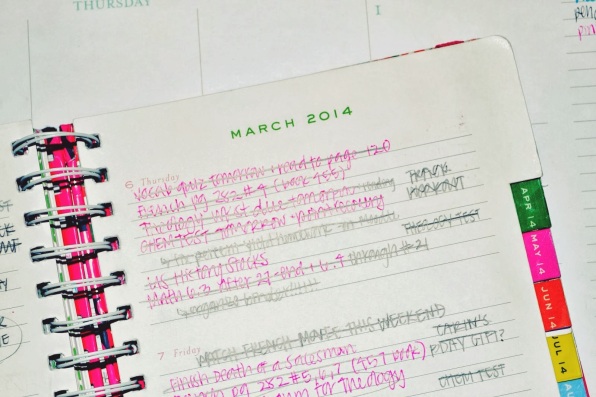You’re relaxing at home after a long day in your virtual classroom, kicked back on the couch with some snacks, watching your favorite Netflix show, when suddenly you recall something your teacher mentioned at the end of class today…
That research paper is due tomorrow!
Your teacher has been talking about it for WEEKS so you knew it was coming! But you haven’t prepared one bit, and now you’ve got a 5-page paper due in the morning, and one of your sources HAS to be from a physical book!
Our brains aren’t built to remember everything at once. As a matter of fact, the more you try to remember everything in your head, the more cluttered and difficult it becomes to remember ANYTHING at all!
Here’s the good news:
You can avoid this by having a planner, and using it in the most effective way!
That being said, here are 7 tips for having the most successful planner.
1. Choose the right planner inserts for you.
There are thousands of planners out there, but you want the one that works for you.
To make things a little easier, check out our Where Do I Start? for Planner Newbies blog post for tips on choosing the right planner/planner inserts to fit your needs and goals.
You can always purchase a separate planner for your academic needs if you like, but there are companies like Simply Luxe Co. who design organizational tools specifically to meet students’ needs!
If you buy your own planner, they will usually come with the months and years already printed on them.
One thing that you should do in your planner when you get it is to write down the name of each class you are taking. This way, you can organize your assignments, due dates, and goals for each class separately.
2. Fill in any permanent due dates.
Most teachers in high school and college will give students a syllabus that may or may not list the due dates of some major projects. For example, an AP English course might require a “Final Paper” that is due on a certain day.
If your teacher doesn’t give you a syllabus for their class, follow these steps:
-
Keep your planner with you!
-
Take advantage of the Q&A sessions, especially on the first day of class.
-
Have a pen and paper ready.
-
Ask your teacher if there are any specific due dates to keep in mind for class.
-
Take notes on what they say and transfer any solid dates to your planner.
Whenever you know a date ahead of time, it’s a good idea to put it in your planner right away, if possible. This is a habit that you can build to be successful in the rest of your life!
3. Write your assignments down daily.
You know the drill! When a teacher has homework to assign, they’ll usually announce it during class. The moment you hear of an assignment, you should write it down in your planner on the day it’s due, as well as in your ‘to-do’ section for the day/month/week.
Here’s a helpful tip:
When you DON’T have homework for a class, write down “None”. By making sure that each class has something under its name, you can be sure that you’ve kept track of everything.

4. Set weekly goals and daily steps to reach them.
Each Monday, ask yourself:
-
What do I want to achieve this week?
-
How can I make that happen?
-
What are the baby-steps I can take to reach my goal?
When you have your weekly goal, break it down even further. This will help you decide what daily steps you can take to reach it!
Don’t forget to fill these steps in on your planner so you remember to do them each day.

5. Keep track of upcoming assignments.
If you have a Science test on Monday of next week, seeing that first thing Monday morning when you check your planner may not help you keep track of that upcoming task!
Don’t let tests or homework sneak up on you. Write down when you have upcoming tests, quizzes, and assignments before the due date. This is especially helpful if your teacher hints that there may be a pop quiz!

6. Practice time management.
Remember how in step 4, we mentioned being specific with the daily steps you take to reach your weekly goals?
This is something that can really benefit you in the long run. Try to ask these questions for every task you give yourself:
-
When is the deadline for this?
-
What are the baby steps I can take to help me complete it on time?
-
How much time should I spend on each step?
-
When will I take these steps?
Create goals for yourself that are SMART.

There is also a great time-tracking app for this called Toggl. It’s one of many different apps out there that you can use to see exactly how much time you’ve spent on something!
7. Keep it positive & make it fun!
Staying Positive
It’s important to recognize your own achievements, however small they may be. Celebrating the completion of smaller steps towards a larger goal will help you feel better about the time you’ve spent, and will motivate you to continue.
That’s why some of our Simply Luxe Co. inserts have a section for “Accomplishments”. It’s where you can highlight what things you are most proud of for the week. If your planner doesn’t have one, make one somewhere on your current planner page each week!
Another thing that you can do is cross out your assignments as you complete them. This will give you a sense of how many things you have left to do. And seeing that you have completed things will also make you feel better about being productive… and you should!

Making Organization Fun
Staying organized doesn’t mean that everything has to fit into a boring little box.
Find ways to add style and color to your planner and really make it pop!
Ways to Customize Your Planner:
-
Use highlighters.
-
Draw pictures.
-
Add motivational quotes or notes.
-
Use sticky notes.
Conclusion
Being organized and using a planner is like eating vegetables. It may be difficult or unappealing to some at first, but the more you do it, the more you’ll start to appreciate the benefits. For you, the number one benefit of being an organized and well-planned person may end up being that it minimizes stress!
All in all, when you are trying to remember 10 things at once, just remember that mistakes will happen.
To review, the steps for having the most successful planner were:
-
Choose the right planner inserts for you.
-
Fill in any permanent due dates.
-
Write your assignments down daily.
-
Set weekly goals and daily steps to reach them.
-
Keep track of upcoming assignments.
-
Practice time management.
-
Keep it positive & MAKE IT FUN!
Ready to shop Simply Luxe Co.'s amazing planner inserts?! You can start right here:



